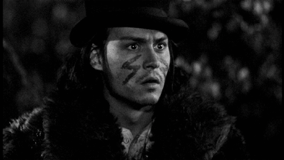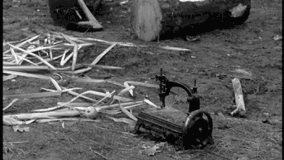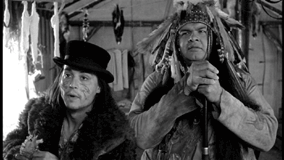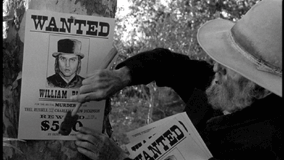Dead Man (Jim Jarmusch) 1995
 How much of a difference can a single shot make while watching a film? Itís an
interesting question, to be sure, since films gain much of their power through
the editorial process, and in most movies the answer seems to be ďNot much.Ē
Still, there several are examples that come to mind (The
Crying Game, Beau Travail, Sleepaway
Camp) where one image turns an entire movie on its head, and Jim
Jarmuschís black and white western Dead
Man contains one that had precisely this effect for me, without any of the
ostentatious surprise that fuels the other examples that I cited. With only a
few minutes to spare, Jarmusch incorporates a point of view setup that turns
what felt like a somewhat self-indulgent meditation on death and dying into a
searing condemnation of the very ideals that America was built on and a pointed
critique of where itís going. Thereís no explicit editorial underlining in
this image, which shows the intrusion of the white manís machinery into the
Native Americansí environment. It contains no dialogue, action, or camera
trickery, but it still crystallizes the concerns of the film into something
tangible. Maybe Iím slow on the uptake, taking almost two hours to understand
what the director had been tiptoeing around all along, nonetheless the
realization hit me like a ton of bricks because suddenly everything that came
before seemed relevant, and the distance between current events and the filmís
1870ís setting immediately dissipated.
How much of a difference can a single shot make while watching a film? Itís an
interesting question, to be sure, since films gain much of their power through
the editorial process, and in most movies the answer seems to be ďNot much.Ē
Still, there several are examples that come to mind (The
Crying Game, Beau Travail, Sleepaway
Camp) where one image turns an entire movie on its head, and Jim
Jarmuschís black and white western Dead
Man contains one that had precisely this effect for me, without any of the
ostentatious surprise that fuels the other examples that I cited. With only a
few minutes to spare, Jarmusch incorporates a point of view setup that turns
what felt like a somewhat self-indulgent meditation on death and dying into a
searing condemnation of the very ideals that America was built on and a pointed
critique of where itís going. Thereís no explicit editorial underlining in
this image, which shows the intrusion of the white manís machinery into the
Native Americansí environment. It contains no dialogue, action, or camera
trickery, but it still crystallizes the concerns of the film into something
tangible. Maybe Iím slow on the uptake, taking almost two hours to understand
what the director had been tiptoeing around all along, nonetheless the
realization hit me like a ton of bricks because suddenly everything that came
before seemed relevant, and the distance between current events and the filmís
1870ís setting immediately dissipated.
 Ostensibly a genre picture, Dead Man is no ordinary western because it has a festering
resentment boiling under the surface that seems to resent the presence of all of
its white characters. Through his radical revisionism, Jarmusch satirizes the
ideals of so many of filmdomís classics and gets exceptionally close to making
a grand statement about our capitalist expansionism that actually holds water.
The culture clash that fuels the subtext behind many Westerns becomes the main
theme here with a vengeance. While that initially seemed noble but ultimately
inadequate subject matter for this film which occasionally feels like a
meandering exercise in style, at the filmís end, however, Jarmusch inserts a
noticeably unnatural contraption into the frame, suggesting that the white
manís culture is as transient as the Native one, and that modern American
culture is as capable to drifting away into a sea of oblivion as any other. What
becomes shockingly apparent from this association is that the myth of the cowboy
was really a corporate creation, fabricated so people felt better about the rape
of the land and the natives. That this sentiment is stated within the context of
a western is even more remarkable.
Ostensibly a genre picture, Dead Man is no ordinary western because it has a festering
resentment boiling under the surface that seems to resent the presence of all of
its white characters. Through his radical revisionism, Jarmusch satirizes the
ideals of so many of filmdomís classics and gets exceptionally close to making
a grand statement about our capitalist expansionism that actually holds water.
The culture clash that fuels the subtext behind many Westerns becomes the main
theme here with a vengeance. While that initially seemed noble but ultimately
inadequate subject matter for this film which occasionally feels like a
meandering exercise in style, at the filmís end, however, Jarmusch inserts a
noticeably unnatural contraption into the frame, suggesting that the white
manís culture is as transient as the Native one, and that modern American
culture is as capable to drifting away into a sea of oblivion as any other. What
becomes shockingly apparent from this association is that the myth of the cowboy
was really a corporate creation, fabricated so people felt better about the rape
of the land and the natives. That this sentiment is stated within the context of
a western is even more remarkable.
 William Blake, Johnny Deppís Cincinnati-bred avenger,
isnít a typical action hero, but becomes a poet, writing with violence,
because of his understanding of a situation that most others seem content to
ignore. At the filmís start, heís more interested in a game of solitaire
than his environment, and his vocation (accountant) seems diametrically opposed
to all things spiritual. As the story proceeds and his awareness increases, he
dons face paint and taps into a natural mysticism that he had previously ignored,
and his delirium seems equally spurned on by his quasi-religious experience and
his nausea. Wounded by a bullet in the chest, and constantly inching closer to
becoming the Dead Man of the title, he moves farther from the reality he
understands, yet seems to grow closer to a deep understanding of things. If the
filmís characterizations of white men as consumerist monsters and Native
Americans as enlightened victims feels a bit simplistic, one need only consider
the infinite slanderous alternative stereotypes that previous westerns have
offered up before such generalizations seem downright reasonable. What saves the
film from descending into a bleeding-heart celebration of its own cultural
enlightenment is its insistence that Blake, despite his insight, still cannot be
assimilated into the Native culture, at least while alive.
He may befriend a native, but Jarmusch never condescends to his
characters by suggesting a Dances With Wolves-style adaptation into their
way of life.
William Blake, Johnny Deppís Cincinnati-bred avenger,
isnít a typical action hero, but becomes a poet, writing with violence,
because of his understanding of a situation that most others seem content to
ignore. At the filmís start, heís more interested in a game of solitaire
than his environment, and his vocation (accountant) seems diametrically opposed
to all things spiritual. As the story proceeds and his awareness increases, he
dons face paint and taps into a natural mysticism that he had previously ignored,
and his delirium seems equally spurned on by his quasi-religious experience and
his nausea. Wounded by a bullet in the chest, and constantly inching closer to
becoming the Dead Man of the title, he moves farther from the reality he
understands, yet seems to grow closer to a deep understanding of things. If the
filmís characterizations of white men as consumerist monsters and Native
Americans as enlightened victims feels a bit simplistic, one need only consider
the infinite slanderous alternative stereotypes that previous westerns have
offered up before such generalizations seem downright reasonable. What saves the
film from descending into a bleeding-heart celebration of its own cultural
enlightenment is its insistence that Blake, despite his insight, still cannot be
assimilated into the Native culture, at least while alive.
He may befriend a native, but Jarmusch never condescends to his
characters by suggesting a Dances With Wolves-style adaptation into their
way of life.
 The insertion of actual ideas into the film suddenly made me
much more sympathetic toward the Native Americans in the film, and made the
somber, elegiac tone forgivable and downright appropriate. Whatís most
shocking about Dead Man, and
specifically Jarmuschís involvement in the production is that itís
completely irony-free because itís so convinced that it has something potent
to say. All of the directorís earlier films seemed mostly interested in the
world only as a stage on which he could set his mocking, but here you sense deep
humanist concern. Jarmuschís global conscience thankfully doesnít result in
a preachy film, however, and as I said, the filmís major theme doesnít fully
emerge until near the end. Most of the running time is spent callously observing
the ignorance inherent in the conflicts of the Wild West, with a slowly dawning
feeling that there must be an alternative. When that alternative finally
arrives, bundled in a single shot and a mess of implications, itís nothing
less than a revelation, for both Blake and the audience.
The insertion of actual ideas into the film suddenly made me
much more sympathetic toward the Native Americans in the film, and made the
somber, elegiac tone forgivable and downright appropriate. Whatís most
shocking about Dead Man, and
specifically Jarmuschís involvement in the production is that itís
completely irony-free because itís so convinced that it has something potent
to say. All of the directorís earlier films seemed mostly interested in the
world only as a stage on which he could set his mocking, but here you sense deep
humanist concern. Jarmuschís global conscience thankfully doesnít result in
a preachy film, however, and as I said, the filmís major theme doesnít fully
emerge until near the end. Most of the running time is spent callously observing
the ignorance inherent in the conflicts of the Wild West, with a slowly dawning
feeling that there must be an alternative. When that alternative finally
arrives, bundled in a single shot and a mess of implications, itís nothing
less than a revelation, for both Blake and the audience.
* * * *
04/24/02
Jeremy Heilman